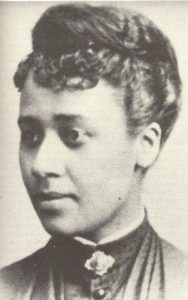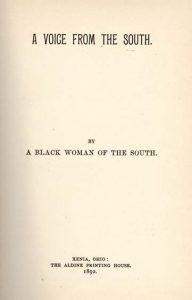About Anna Julia Cooper

Anna Julia Cooper was a highly educated women who laid the foundation for many Black feminist scholars. Cooper left her home in North Carolina to attend Oberlin College. Cooper went on to continue her graduate studies at Columbia University and then earned a doctorate at the Sorbonne. Cooper fostered seven children and was focused on creating community and educating all children. Cooper taught classics, modern and ancient languages, literature, mathematics, and science well into her eighties and was the principal of the prestigious M Street School. Due to politics, some white members of the District of Columbia’s board of education conspired against Cooper. They accused her having a sexual affair with John Love, one of her foster children.
Cooper offered a counter narrative to W.E.B Du Bois and Booker T. Washington’s ideas about education. Although both men had vastly different ideas on how to educate Black Americans in the wake of reconstruction, they both saw education as a means for economic uplift.
Gender Equity
- Anna Julia Cooper laid the foundation for Black feminist thought in her her essay on the “Intellectual Progress of the Colored Women.” Her quote “The colored women feels that woman’s cause is one and universal” is foundational because Cooper realizes that the oppression Black women face—due to their race and gender—is experienced by both Black men and white women, but unlike other groups, Black women are not committed to their identity because their identities do not confer social privilege. Thus, it is necessary to champion the rights for Black Women because they are oppressed by gender and race and that liberating Black women—seeing them as equal—would allow marginalized genders and race to experience social uplift which extends well beyond just Black women.
“Women’s wrongs are thus indissolubly linked with tall undefended woe, and the acquirement of her ‘rights’ will mean the final triumph of all right over might, the supremacy of moral forces of reason, and justice, and love in the government of the nation’s earth.”
–Anna Julia Cooper, Intellectual Progress of Colored Women
 Cooper publishes, “A Voice From the South,” which becomes a foundational text for Black feminist theory.
Cooper publishes, “A Voice From the South,” which becomes a foundational text for Black feminist theory.